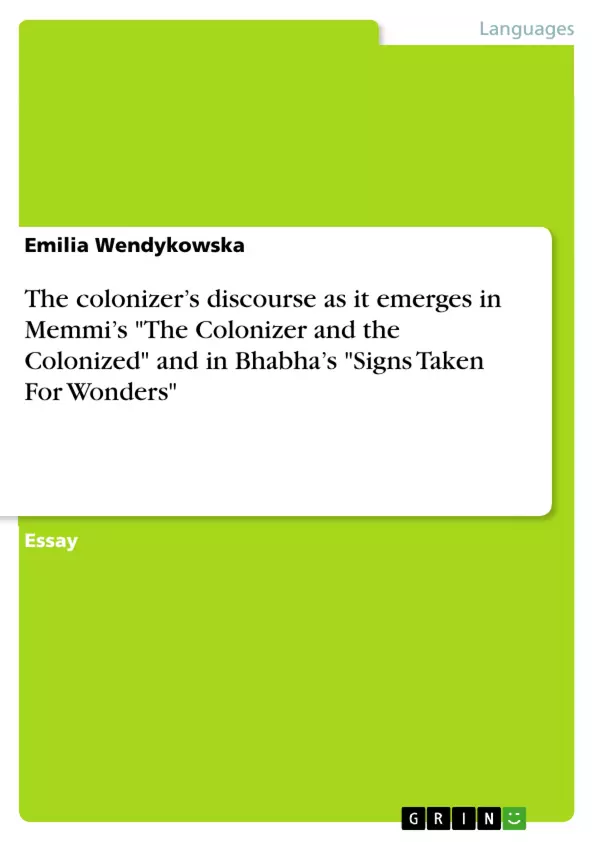The following essay deals with the discourse colonizer uses; based on Bhabha's "Signs Taken for Wonders" and Memmi's "The Colonizer and the Colonized".
Inhaltsverzeichnis (Table of Contents)
- The Colonizer's Discourse as it Emerges in Memmi's The Colonizer and the Colonized and in Bhabha's “Signs Taken For Wonders”
- Colonial Discourse
- The Colonizer's Written Text and the 'English Book'
- The Discovery of the 'English Book'
- Mimicry and Hybridity
- The Colonizer and the Colonized
Zielsetzung und Themenschwerpunkte (Objectives and Key Themes)
This essay examines the concept of colonial discourse as it is presented in the works of Albert Memmi and Homi Bhabha. It explores how both authors shed light on the power dynamics and psychological effects of colonization on both the colonizer and the colonized.
- The power dynamics and influence of colonial discourse
- The impact of the colonizer's written text and the symbolic significance of the "English book"
- The concept of mimicry and its role in shaping the relationship between colonizer and colonized
- The creation of hybridity and its implications for colonial power
- The psychological effects of colonization on both the colonizer and the colonized
Zusammenfassung der Kapitel (Chapter Summaries)
This essay begins by defining the term "discourse" in its postcolonial context and examining its relationship to power and knowledge. The author then focuses on the work of Edward Said and Homi Bhabha, exploring their contributions to understanding colonial discourse. It emphasizes the colonizer's dominance through the imposition of cultural norms, language, and even the written text.
Bhabha's analysis of the "English book" as a symbol of colonial authority and its subsequent mimicry and hybridity is discussed. The essay highlights the complex relationship between the colonizer and the colonized, emphasizing the inherent ambivalence in this dynamic.
The essay concludes by delving into Albert Memmi's The Colonizer and the Colonized, exploring his insights into the psychological effects of colonization on both parties. Memmi's analysis highlights the economic motivations behind colonization and the resulting social and psychological consequences.
Schlüsselwörter (Keywords)
The main focus of this essay is on colonial discourse, examining the complex relationship between the colonizer and the colonized. Key terms and concepts include: power dynamics, knowledge, mimicry, hybridity, ambivalence, "English book," and the psychological effects of colonization.
- Quote paper
- Emilia Wendykowska (Author), 2012, The colonizer’s discourse as it emerges in Memmi’s "The Colonizer and the Colonized" and in Bhabha’s "Signs Taken For Wonders", Munich, GRIN Verlag, https://www.grin.com/document/196804



